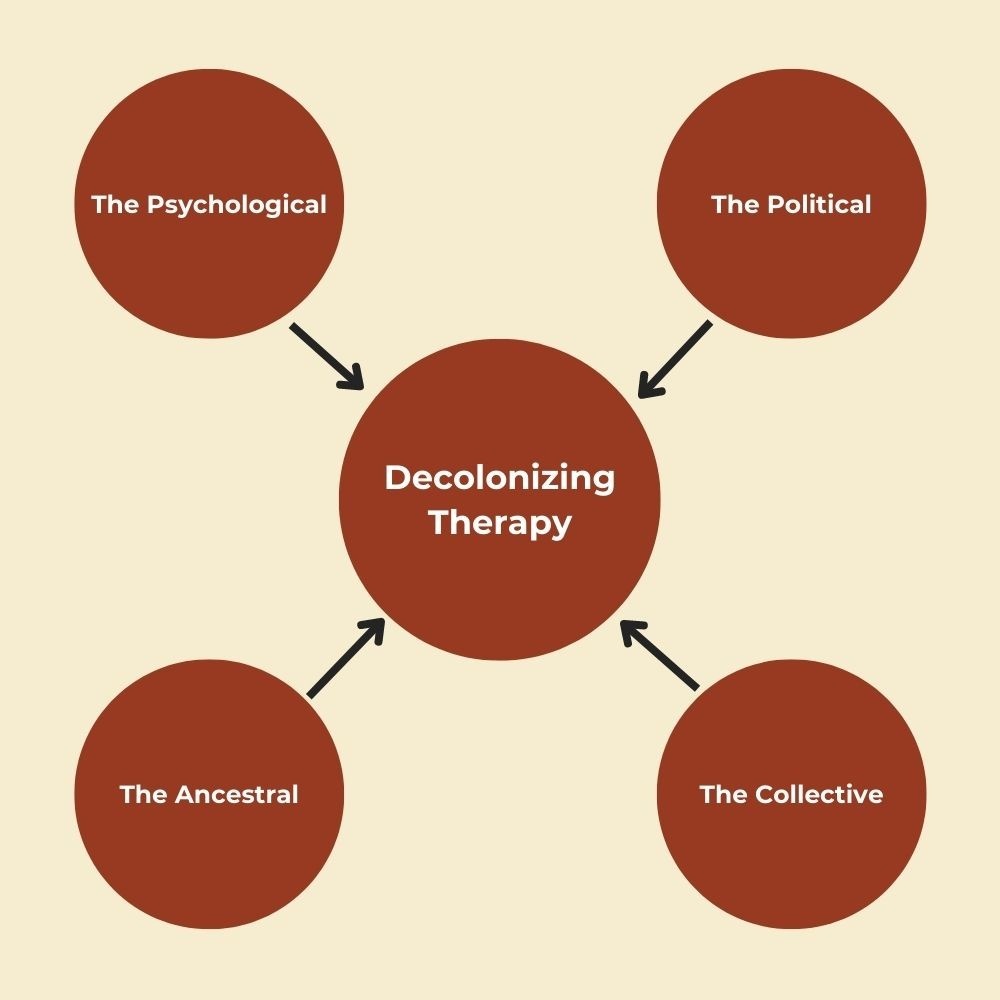
Colonialism is one of humanity’s core wounds. Its ripple effect is vast and deep, but often invisible.
When a wound goes unnamed and untended, it will grow and fester–eventually infecting everything around it.
We cannot heal what remains unseen and unacknowledged.
Decolonizing Therapy shines a bright and loving light on the core wound of colonialism so that we can begin to heal.
Decolonizing Therapy sits at the intersections of the psychological, political, ancestral, and the collective.
It’s a loving, but urgent call to:
- bravely and earnestly confront the multi-generational impact of colonization on all of us
- uncover and tend to the real roots of symptoms and suffering
- to recenter a collective healing process for all indigenous peoples, globally; and for those forcibly displaced and made to engage in emotional and physical labor in order to survive–in order to be seen as human
It calls for an end to individualistic and pathologizing Eurocentric methods of wellness–one that includes those who have been purposely excluded and historically forgotten.
It demands a model of mental health that is accessible to all and that offers a path to liberation and thriving.

What is colonization?
Colonization refers to the behavioral, psychological, institutional, political, spiritual, interpersonal, and economical methods that have exploited and oppressed Indigenous peoples globally–historically and present day.
Why should we decolonize our therapy and mental health practices?
We have a global mental health crisis. Helpers, healers, mental health professionals and those they serve are suffering and dying.
But the dominant Eurocentric lens that guides our practice fails to tell a complete and accurate story of why we are sick and how we get well.
Our current approach to mental health is steeped in colonialism.
Therefore, it can never lead to true healing and liberation for all people.
The existing system serves a very small percentage of people.
Most of us are only taught how to (barely) survive. How to cope with ongoing trauma and adapt to oppression. And the rest are left behind completely. Unable to even access these imperfect systems of care.
We can continue to speak only of the impact of childhood trauma (important, but incomplete) or we can get to the root of the problem: separation.
Separation: from land, our ancestry, community, and our innate joy.
Our healing & our ancestors' experiences are deeply tied together.
Our wellness plans should reflect that.
We need more people who commit to an ongoing process of emotional decolonization. Who are prepared to help the world dig deep and access true liberation, healing, and joy.

Cracking Open Colonial Consciousness
What is emotional decolonization?
Emotional Decolonization (TM) is the deeply intimate process of getting to the root of things.
It’s an invitation to question and unlearn beliefs and standards of practice
that have gone unquestioned for way too long.
The process involves:
-
courageously reckoning with the pain of our inherited past
-
reclaiming of the gifts and wisdom of our ancestors
-
emotionally deprogramming from historical and present day forms of colonial violence
-
untangling from psychological enslavement
-
co-creating new pathways for wellness not dependent on systems that keep us sick & tired
This work starts with the individual, but leads to shifts in collective consciousness that contribute to structural & systemic change.
Emotional decolonization is a small, but powerful and essential step towards literal land decolonization.

